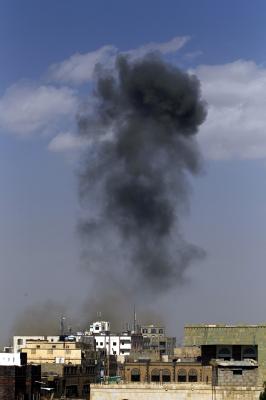ADEN – ISIS militants claimed responsibility for a suicide car bombing outside Yemeni President Abd-Rabbu Mansour Hadi’s residence in the southern city of Aden on Thursday that killed at least six people.
Officials said Hadi was inside his residence at the Maashiq Palace at the time of the attack but was unharmed.
Hadi’s office, in a statement carried by the government-run Saba news agency, said that 11 other people were also injured in the attack, in which a car tried to crash through a security checkpoint guarding the palace.
“A booby-trapped car was confronted while trying to break through the outer security … and (security) prevented it from getting through by opening fire at it and detonating it,” the statement said.
It said that six people were killed, five of them members of the palace security detail and one civilian.
Local officials and witnesses earlier reported that seven people had died and 10 were injured, and that the majority of the casualties were civilians.
It was the latest in a spate of deadly attacks by Islamist militants on Yemeni government and security targets.
In a statement posted online, ISIS said the attack was carried out by a suicide bomber it identified as Abu Hanifa al-Hollandi. The nom de guerre suggested the attacker was a Dutch citizen.
Hadi fled the capital Sanaa in 2015, after the Houthis — a Yemeni militia that hails from the Zaydi branch of Shi’ite Islam — seized his presidential palace.
The Houthis later advanced through a large swathe of Yemen and forced Hadi into exile in Saudi Arabia. But he has managed to re-base in Aden, Yemen’s second largest city, where his government is trying to project authority after its loyalists, backed by Sunni Muslim Gulf Arab forces, seized it back in July.
Aden, a city of some one million people, has been gripped by lawlessness, with regular bomb and gun attacks on security forces and civil servants, including judges.
Vice President and Prime Minister Khaled Bahah, who has also recently returned to Aden and was believed to be staying at the Maashiq Palace, has been trying to coordinate efforts to bolster security in the city.
Dozens of armoured vehicles and troops from the United Arab Emirates arrived in Aden’s port on Wednesday, security officials said, as part of a plan to tackle security chaos.
Backed by a Saudi-led military alliance of Sunni Muslim Arab states, Hadi’s forces have been battling the Iran-allied Houthis and supporters of ex-president Ali Abdullah Saleh who are in control of Sanaa. The war has killed 6,000 people.
ISIS insurgents have also stepped up operations, emerging as a forceful rival to Al Qaeda in the Arabian Peninsula, which has been the main Islamist militant group in the country in recent years.
Suicide bombers from ISIS killed 15 people in an attack on a hotel housing the government in Aden and seven at a Houthi-run mosque in Sanaa on Oct. 5.

